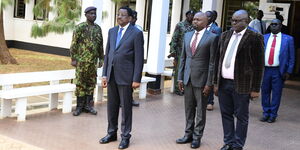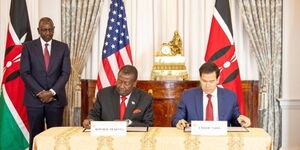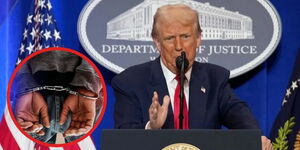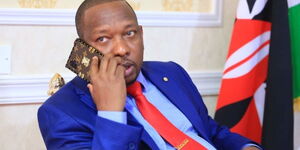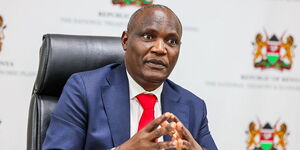As the curtains come down on the Africa Growth Opportunity Act (AGOA), focus has been shifted to securing a new trade deal with the United States and salvaging exports worth billions of shillings.
The pact officially expired on Tuesday, September 30, nearly two decades after it was introduced by former U.S. President Bill Clinton. In the deal, more than 30 countries enjoyed tariff exemptions for their exports into the U.S. For Kenya, key exports secured in the deal were textiles, tea, and coffee.
However, while speaking on NTV on Wednesday, October 1, Kenya Association of Manufacturers (KAM) boss Tobias Alando noted that Kenya would need to comply with certain conditions to secure a new deal or an extension to the pact..
The top of this would be for Kenya to cease sourcing raw materials from China and India, nations with which the U.S. has ideological differences. In the textile sector, for instance, Kenya gets its raw materials, such as cotton, from the two countries.
Alando argued that the imposition of tariffs by U.S. President Donald Trump on the two countries posed a great danger to access to such raw materials, and this would impact the production of exports headed for the U.S. market.
Alando noted that the solution would be for the country to build its own capacity, meaning that Kenya would then need to revive its cotton industry to curb any potential disruptions to trade.
By doing so, the country would cut the costs incurred in importation and earn more revenue as it would have its own raw materials to make the required fabrics.
“When there is a trade beef between the US and other countries, the US would expect that the countries they trade with, for example, Kenya, would not source any materials from countries where they have already imposed tariffs,” Alando noted.
“So for us to get a renewal or extension, there would be conditions. One condition would be for us not to source from such countries. That would make us develop our own value chain in terms of cotton, and probably that is what we should have been doing for the past two decades,” he added.
The AGOA expiry has left over 66,000 Kenyans fearing for their employment status. Since its inception, Kenya’s textile exports have risen to $500 million (Ksh64.6 billion), providing much-needed revenue to Kenya’s economy.
Even so, the latest reports from the White House indicated that President Trump was supportive of a one-year extension to AGOA.
According to Reuters, a senior White House official disclosed that Trump will endorse the extension, despite his silence on the pact since taking office in January.
Also, President William Ruto, while on the recent U.S. trip on the sidelines of the United Nations General Assembly (UNGA), announced that Kenya would likely sign a new bilateral trade agreement with the United States by the end of the year.

